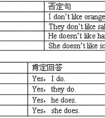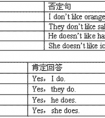按要求完成句子,每空一词。1. We go swimming every afternoon. (改为祈使句)______ ______go swimming every afternoon.2. My sister is twelve years old. (就画线部-七年级英语
She smiled gratefully. 她感激的笑了笑。
3)还有一些以-ly结尾的副词,表示动作发生的状况:
He left the town secretly. 他悄然离开了这座城市。
程度副词和强调副词 :
1)程度副词可修饰动词,表示“到某种程度”: Is she badly hurt? 她伤得重吗?
[说明] 这类副词除修饰动词外,还可修饰形容词(a)或另一副词(b):
a. fairly simple 相当简单 quite correct 完全正确
b. wonderfully well 好极了 do it very quickly 干得很快
2)much 是一个特殊的程度副词,它可以:
a. 修饰形容词等:
I’m not much good at singing. 我唱歌不太好。
b. 修饰比较级:
You sing much better than me. 你比我唱的好多了。
Their house is much nicer than ours. 他们的房子比我们的好多了。
疑问副词和连接副词:
1)疑问副词:疑问副词用来引导特殊问句:
how: How is your grandmother? 你奶奶身体好吗?
where: Where does she come from? 她是哪儿人?
when: When can you come? 你什么时候能来?
why: Why was he so late? 他为什么来得这么晚?
2)连接副词:连接副词意思和词形都和疑问副词一样,但都引导从句或与不定式连用:
how: Do you know how to start this machine? 你知道这台机器怎样启动吗?
where: I don’t know where he lives. 我不知道他住在哪儿。(引导宾语从句)
when: Tell me when you’ll be ready. 告诉我你什么时候准备好。(引导宾语从句)
why: That’s why I came round. 这就是我来的原因。(引导表语从句)
一些其它类型的副词,如表示方向的副词:
Let’s go inside. 咱们到里面去。
Take two steps forward. 向前走两步。
1、实义动词前,be动词、情态动词之后。
I am also Bush.
I can also do that.
I also want to play that games.
I get up early in the morning everyday. 我每天早早起床。
He gave me a gift yesterday. 他昨天给了我一件礼物。
She didn't drink water enough. 她喝的水不够。
The train goes fast. 火车跑得快。
We can go to this school freely. 我们可以免费到这家学校学习。
They left a life hardly then. 当时他们的生活很艰难。
He has a new hat on today. 他今天戴了一顶新帽子。
I have seen this film twice with my friends. 这部电影我和朋友看过两次。
2、副词修饰形容词,副词时,副词在前面,而被修饰的词在后面。
It's rather easy, I can do it. 这很容易,我能做到。
He did it quite well. 他做得相当好。
It's rather difficult to tell who is right.很难说谁是对的。
It's so important that I must tell my friends. 这件事太重要了,我得告诉我的朋友。
It's much better. 好多了。
3、频度副词可放在实义动词的前面,情态动词和助动词的后面。
I often help him these days. 这些日子我经常帮助他。
I always remember the day when I first came to this school.
我常常记得我第一次来学校的那一天。
You mustn't always help me. 你不能老是帮助我。
He seldom comes to see us. 他很少来看我们。
We usually go shopping once a week. 我们通常一周买一次东西。
The new students don't always go to dance. 新学生并不时常去跳舞。
4、疑问副词,连接副词,关系副词以及修饰整个句子的副词,通常放在句子或从句的前面。
When do you study everyday? 你每天什么时间学习?
Can you tell me how you did it? 你能告诉我你如何做的吗?
First, let me ask you some questions. 先让我来问几个问题。
How much does this bike cost? 这辆车子多少钱?
Either you go or he comes. 不是你去就是他来。
The students were reading when the teacher came into the classroom. 当老师进教室时,学生们正在读书。
5、时间副词和地点副词在一个句中, 地点副词在前面时间副词在后面。
We went shopping in the supermarket at 9 o'clock yesterday.
昨天九点钟我们到超市买东西了.
What were you doing in the classroom yesterday afternoon?
昨天下午你在教室里干什么?
The accident took place in the Eleven Avenue one hour ago.
一小时前十一号大街发生了一场事故。
6、否定副词在句首,句子要倒装,如:
Never have I felt so excited!
1) close与closely
close意思是"近"; closely 意思是"仔细地"
He is sitting close to me.
Watch him closely.
2) late 与lately
late意思是"晚"; lately 意思是"最近"
You have come too late.
What have you been doing lately?
3) deep与deeply
deep意思是"深",表示空间深度;deeply时常表示感情上的深度,"深深地"
He pushed the stick deep into the mud.
Even father was deeply moved by the film.
4) high与highly
high表示空间高度;highly表示程度,相当于much
The plane was flying high.
I think highly of your opinion.
5) wide与widely
wide表示空间宽度;widely意思是"广泛地","在许多地方"
He opened the door wide.
English is widely used in the world.
6) free与freely
free的意思是"免费";freely 的意思是"无限制地"
You can eat free in my restaurant whenever you like.
You may speak freely; say what you like.
副词有加a或ly的 区别在于通常加a 的副词描述一种状态,而加ly 的副词则倾向于感觉。
考点名称:介词
- 介词:
是一种用来表示词与词、词与句之间的关系的虚词,在句中不能单独作句子成分。
介词后面一般有名词代词或相当于名词的其他词类,短语或从句作它的宾语。 - 介词的分类:
(1)表示时间,处所:从 自 自从 于 打 到 往 在 当 朝 向 顺着 沿着 随着
(2)表示方式:按 照 按照 依 依照 本着 经过 通过 根据 以 凭
(3)表示目的:为 为了 为着
(4)表示原因:因 由于 因为
(5)表示对象,范围:对 对于 把 向 跟 与 同 给 关于
(6)表示排除:除 除了 除去 除非
(7)表示被动:被 叫 让 给
(8)表示比较:比 和 同
上述介词中的“着,了,过”是语素,不是动态助词。 介词at, in, on的区别:
1. 表示时间,注意以下用法:
(1) 表示时间的某一点、某一时刻或年龄等用 at。如:
I get up at six in the morning. 我早上六点钟起床。
He got married at the age of 25. 他 25 岁结婚。
(2) 泛指一般意义的上午、下午或晚上以及月或年等较长的时间,一般用 in。如:
We watch TV in the evening. 我们晚上看电视。
He went to Japan in 1946. 他于 1946 去了日本。
(3) 若表示星期几或某一特定的日期,则用 on。如:
He left here on the fifth of May. 他于 5 月 5 日离开这儿。
2. 表示地点、场所、位置等,注意以下用法:
(1) 表示某一点位置,用 at。如:
We live at No 87 Beijing Road. 我们住在北京路 87 号。
The hospital is at the end of the street. 医院在这条街的尽头。
与名词所有格连用表示地点,也用 at。如:
at my sister’s 在我姐姐家 at the doctor’s 在医务室
(2) 表示空间或范围,用 in。如:
What’s in the box? 这盒子里有什么?
He lives in Paris with his wife. 他同他妻子住在巴黎。
但有时两者可换用。如:
The meeting was held at [in] the hotel. 会议在宾馆举行。
(3) at 与 in 的另一个区别是:at 用于指较小的地方,而 in 用于指较大的地方。如:
in Shanghai 在上海 at the station 在车站
但是,大与小是相对的,有时随着说话者的着眼点不同,大地方也可能用 at(比如把一个大地方看作一个点时)。如:
Our plane refuelled at London. 我们的飞机在伦敦加油。
We stopped for an hour at Moscow on our way to Paris. 我们在去巴黎的途中在莫斯科停了 1 个小时。
(4) 介词 on 用于地点,主要指在某物的表面。如:
What’s on the table? 桌上有什么?
There’s a wallet lying on the ground. 地上有个钱包。
注:在少数搭配中,也用介词 on。如:
He works on a farm. 他在农场工作。
3. 在某些搭配中,三者的区别与英国英语和美国英语有关:
in the street (英) / on the street (美) 在街上
in the road (英) / on the road (美) 在路上
in the team (英) / on the team (美) 在这个队
at the weekend (英) / on the weekend (美) 在周末
at weekends (英) / on weekends (美) 在周末
4. 有时三者的差别与搭配习惯和用法有关:
in bed / on the bed 在床上
in the tree (多指树外之物) / on the tree (多指树本身之物) 在树上介词besides,but,except的用法区别:
- 最新内容
- 相关内容
- 网友推荐
- 图文推荐
| [家长教育] 孩子为什么会和父母感情疏离? (2019-07-14) |
| [教师分享] 给远方姐姐的一封信 (2018-11-07) |
| [教师分享] 伸缩门 (2018-11-07) |
| [教师分享] 回家乡 (2018-11-07) |
| [教师分享] 是风味也是人间 (2018-11-07) |
| [教师分享] 一句格言的启示 (2018-11-07) |
| [教师分享] 无规矩不成方圆 (2018-11-07) |
| [教师分享] 第十届全国教育名家论坛有感(二) (2018-11-07) |
| [教师分享] 贪玩的小狗 (2018-11-07) |
| [教师分享] 未命名文章 (2018-11-07) |


![How much does it ______ to fly from Yancheng to Hainan Island?[ ]A. cost B. payC. spend D. take-七年级英语](http://www.00-edu.com/d/file/ks/4/2/shiyidongci/2020-01-05/small7dcf2f05998de63e10cc3629787031c81578210087.png)

![He always _____TV in the evening. He _____ listening to the radio. [ ]A. watch, don't like B. watches, doesn't like C. watching, don't like D. watch, do-七年级英语](http://www.00-edu.com/d/file/ks/4/2/shiyidongci/2020-01-05/small45d599b4a60b84e61cec210bfbf051f51578214524.png)
![I'd rather ___ to the Mcdonald's Restaurant because I like to listen to quiet music.[ ]A. to go B. going C. go D. went-八年级英语](http://www.00-edu.com/d/file/ks/4/2/shiyidongci/2020-01-05/small1767bba1727fef2c035c53dcbd9bc20e1578209517.png)
